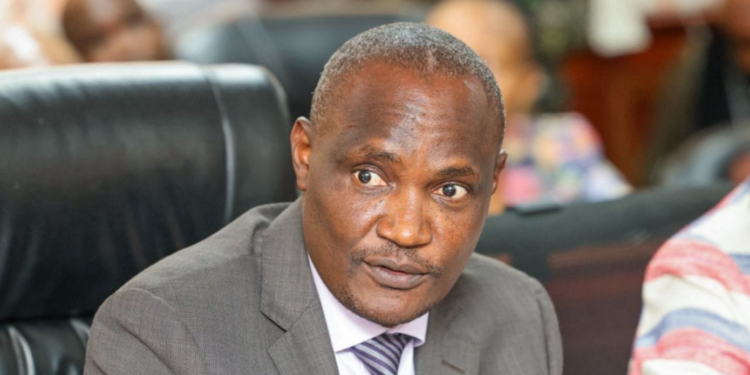Treasury Cabinet Secretary John Mbadi faced intense scrutiny from the Senate Committee on Finance and Budget over the government’s proposed KES 20 billion reduction in county allocations, a move sparked by revenue shortfalls following the rejection of the Finance Bill 2024. Senators argued that the cuts would severely impact devolved functions, including healthcare, education, and infrastructure.
The heated session saw Mbadi defending the government’s decision as necessary due to lower-than-expected revenue collection but facing backlash from senators who accused the national government of protecting its own interests while sacrificing essential county services. “We cannot reduce funds to counties that are already struggling with nondiscretionary expenses like salaries,” Senator Bonnie Khalwale said, adding, “Why is it so easy to slash funds for counties but not the National Government Constituency Development Fund (NG-CDF)?”
The core of the debate centered on the Division of Revenue Amendment Bill 2024, which proposes a reduction of county allocations to KES 380 billion from the KES 400 billion initially set. Mbadi explained that the downward revision was necessitated by lower revenue projections, which had fallen from KES 2.9 trillion to KES 2.6 trillion due to the failure of the Finance Bill.
“Parliament can either agree to amend the Division of Revenue Act or reject it, but you cannot base the shareable revenue on KES 2.9 trillion when we are dealing with KES 2.6 trillion,” Mbadi stated.
Senators, however, were unconvinced.They warned that the proposed cuts would cripple counties, which rely on predictable and stable funding to provide essential services.
A significant part of the senators’ opposition stemmed from the burden placed on counties by non-discretionary expenditures linked to national government policies. These include obligations arising from the Housing Levy, community health worker stipends, and enhanced contributions to the National Social Security Fund (NSSF). According to Senator Fatuma Dullo, these policies were imposed on counties without the necessary funding.
Mbadi acknowledged that both levels of government have non-discretionary expenses but urged counties to trim their discretionary spending. “Counties, like the national government, must cut back on unnecessary expenditures, such as hospitality and travel,” he said, suggesting that both sides could absorb the cuts if they focused on reducing such costs.
Senators questioned the legality of the proposed amendment, citing concerns that altering the Division of Revenue Act after its passage could lead to legal challenges. Khalwale argued that the government had no power to amend the Act without violating the Constitution. “The courts will have a say in this. What we are doing is illegal,” he said.
Mbadi countered, saying the amendment process was constitutional, as both houses of Parliament had the authority to approve changes in light of shifting revenue realities. “We are not reducing county allocations arbitrarily; we are following proper legislative procedure,” he insisted.
Senators also pressed Mbadi on the issue of tax evasion and inefficiencies at the Kenya Revenue Authority (KRA). Khalwale expressed concern that tax leakages were exacerbating the revenue shortfall. “We wouldn’t be here if we addressed tax evasion and improved our financial management systems,” he said.
Mbadi acknowledged the problem, noting that the KRA’s outdated systems were part of the issue. He revealed that his ministry had allocated KES 560 million to upgrade KRA’s tax collection system. “We must modernize our tax system and reduce revenue leakages,” Mbadi said, adding that reforms were in progress.
A recurring theme in the session was the delayed disbursement of the Equalization Fund, which was created to support marginalized counties. Senators pointed out that the fund had not been credited to the designated account for several years, with arrears totaling KES 52 billion.
Mbadi admitted to the backlog and promised that steps would be taken to clear it. “We recognize the problem and are committed to settling the arrears within three years,” he said.
Throughout the session, senators criticized the national government for shielding its own programs while cutting county budgets. Mbadi’s defense that national government cuts were larger in percentage terms — 93.6% for the national government and 6.4% for counties — did little to quell the committee’s frustration.
The senators pointed out that counties bear the brunt of essential service delivery, particularly in health, primary education, and water, yet receive disproportionately lower shares of revenue.
Further complicating matters was the delay in disbursement of county funds, which had forced many counties to resort to high-interest loans to meet their obligations. Mbadi promised to address the issue, citing ongoing discussions with the Attorney General to ensure timely disbursements.
“We want to make sure that counties receive their funds on time. It’s not in the Treasury’s interest to delay disbursements,” he said.
The session ended with no resolution, as the Senate vowed to challenge the proposed cuts, setting the stage for a contentious debate over the future of county funding in Kenya.


















